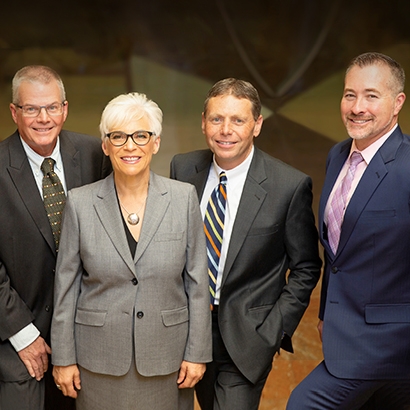The Behnke Ashmore Group helps clients manage wealth so their loved ones, finances, and values are secure after they pass.
When a fatal illness or accident strikes, the surviving spouse or family members are often left asking, "What do I do now?" This concern is common for family members because many times the deceased previously never engaged the family in the financial planning and decisions of the household.
At the Behnke Ashmore Group at Morgan Stanley in Dallas, Sallie Behnke and Christine Ashmore focus on working with large families, helping them manage their wealth and the complexities that go with it, including those tragedies where a family is hit by the proverbial bus – or any other “life event,” predictable or not.
The “bus” question is worth asking, Sallie and Christine believe, because too often they have seen cases where the aftermath can be more than just sad.
“We have experienced many client situations where we are brought in after the patriarch/matriarch passes and the surviving family members are confused, nervous and unaware of the family’s financial planning,” says Sallie. “They didn’t have the information or knowledge to execute on the estate planning or manage the household going forward.”
Wealth management planning should start early
“Even without unexpected illnesses and accidents, wealth creates complexities and those require comprehensive wealth management,” says Sallie. “So we encourage our clients to start their planning early. This includes developing an integrated investment plan that maintains a focus on optimizing performance while also managing risk.”
According to Christine, the process starts with open communication.
“By encouraging openness between family members and our team, we best prepare them for when an emotional loss occurs, and that allows the family to focus on grieving and honoring the deceased in place of worrying about the financial state of the family,” says Christine.
To help meet the individual needs of each client, the Group develops wealth strategies which often include tax planning and estate planning, as well as a robust family governance framework to help sustain family unity, values and wealth through successive generations and charitable planning.
A philosophy of open communication
Starting on day one of a relationship, the Financial Advisors work with their clients to prepare a comprehensive wealth management plan and then share that plan with the client’s heirs over a series of family meetings. So if there is an unexpected tragedy, the family is prepared.
“We encourage the spouse and family to come to the table to start the education process and understand the whole financial picture,” explains Sallie.
Relieving the burden of financial concerns
“Our goal is to take the worry and financial concerns off our clients’ plate before they have to deal with a life event. A lack of knowledge introduces insecurity. We bring security back into our client’s life by helping them understand that they matter, Sallie explains.
This planning, in conjunction with the family meetings and the support of the Behnke Ashmore Group team, helps to ensure the heirs are prepared to handle the financial aspects of losing a loved one, whether the loss comes unexpectedly or naturally after a long life.
"The first step is to gather the information,” said Christine. “We review the estate planning documents and focus on understanding the pieces of the puzzle.
“We then work with the family to understand their goals, making sure their plan meets the goals they have laid out,” said Christine. “If the goals and the plans are not matching up, we help the family make the changes needed to help them pursue their goals.”
"It's critically important to understand the purpose of the assets,” said Sallie. “For example, the wealth management investment objectives for the surviving spouse will be different from the wealth management investment objectives for their children.”
Sallie and Christine stress that once a plan is in place, the Financial Advisor must be capable of helping the family members execute a plan when a death occurs.
Lessening confusion and chaos
“We have experienced many client situations where we are brought in after the patriarch/matriarch passes and the surviving family members are confused, nervous and unaware of the family’s financial planning,” says Sallie. “They didn’t have the information or knowledge to execute on the estate planning or manage the household going forward.
They have seen many instances where the grieving spouse has never participated in making investment decisions for the family and is overwhelmed by the thought of having to do it on their own.”
“We have had new clients come to us after a tragedy and ask if they have enough money to maintain their current quality of life,” says Christine. “We strongly feel that proper planning and communication beforehand helps to avoid uncertainty,” says Christine.
The family office environment the Group has created helps administer to a client's investments, financial planning, and charitable giving.
“We utilize a team-based approach that is both collaborative and coordinated,” says Sallie. “Through our network of relationships with our client’s trusted advisors, we put ourselves in a strong position to help our clients manage their financial life.”
Working with a client’s Trust and Estate attorney on the client’s estate plans, the team helps to incorporate the client’s wishes. Financial Advisors do not provide legal advice but they can assist in answering financial questions.
“We run through scenarios detailing the assets, and where they are going. We will even get into the details of the estate plan, drilling down into specific trusts that will be formed and the estimated amount of income that will be generated to support the surviving spouse,” says Christine.
Educating heirs about estate planning
The Group also places a high priority on educating children, especially adult children who are, or will be, beneficiaries of the family’s assets, on the family’s financial plan.
Over years of working with high net worth families, the team has found that families often avoid sharing information about their assets, fearing their children will lose their drive and ambition.
“We counsel our clients that it is vital for adult children to understand the parent’s estate planning so that they can appropriately prepare their estate plans to avoid an estate tax problem,” says Sallie.
The Behnke Ashmore team works to help ease the anxiety and worry of what will happen when one of spouse passes away.
Serving the surviving female spouse
Often, the surviving spouse is female, and Sallie and Christine believe female survivors find it easier to establish a rapport with women Financial Advisors.
So what is the answer to the often asked question posed at the beginning of this article? What does one do when faced with an unexpected tragedy?
The answer is that the pain of such an event cannot be decreased, but with planning and open communication, the worry can certainly be controlled and lessened.
Morgan Stanley Smith Barney LLC (“Morgan Stanley”), its affiliates and Morgan Stanley Financial Advisors and Private Wealth Advisors do not provide tax or legal advice. Clients should consult their tax advisor for matters involving taxation and tax planning and their attorney for matters involving trust and estate planning, charitable giving, philanthropic planning and other legal matters.
Morgan Stanley offers a wide array of brokerage and advisory services to its clients, each of which may create a different type of relationship with different obligations to you. Please consult with your Financial Advisor to understand these differences.



